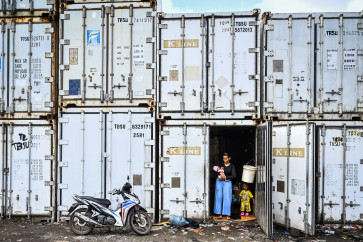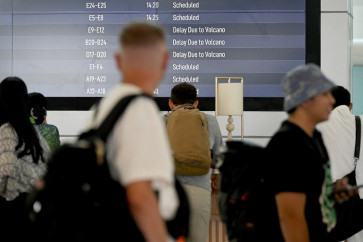Popular Reads
Top Results
Can't find what you're looking for?
View all search resultsPopular Reads
Top Results
Can't find what you're looking for?
View all search resultsPublic toilet attendants do it tough in struggling employment market
Routine business: A public toilet attendant, Andi, sits in front of the rest room door at Gambir railway station, Central Jakarta, on Saturday
Change text size
Gift Premium Articles
to Anyone
Routine business: A public toilet attendant, Andi, sits in front of the rest room door at Gambir railway station, Central Jakarta, on Saturday. The majority of attendants work more than 15 hours per day for a very limited salary. JP/HASYIM WIDHIARTO
Ahmad left his family in Tasikmalaya, West Java after being offered a job as a public toilet attendant at the Pasar Minggu railway station in South Jakarta. The job was not glamorous, but after trying unsuccessfully to sell clothes at the market, Ahmad knew the opportunity was not to be turned down.
"I wanted to go back to Tasikmalaya and farm... but I realized this job was better than doing nothing in the city," the 39-year-old said.
His boss, a former neighbor from Tasikmalaya, asked him to maintain one of the public toilets at Pasar Minggu and let him use a five-by-two meter prayer room to sleep in and store his belongings.
Ahmad wakes every morning at 4 a.m. and begins by sweeping the floors and filling the buckets before residents living near the station arrive for a bath or for Shubuh prayer in the room adjacent to the toilet.
"Then, I stand by the toilet entrance sweeping the floors and collecting the fee. I finish up at 10 p.m.," the father of two told The Jakarta Post on Saturday.
Ahmad receives 8 percent commission from the toilet's daily revenue plus some money for food.
"In one day I can save Rp 15,000, at the very least," he told the Post.
Pasar Minggu station, which runs almost 350 trains per day between Bogor, West Java and Jakarta, sees 7,500 passengers passing through the gates on a normal day.
With a wet market, two shopping malls and a bus terminal located within one hundred meters of the station, it is one of the busiest public spots in South Jakarta.
"Even though the area I work in is small, at least I can receive a fixed income from my job," he said.
Andi, a public toilet attendant at Gambir railway station in Central Jakarta, shares a similar story.
The 23-year-old has worked at the station for four years after failing to find another job.
"I have tried looking for other jobs but have always ended up in failure," he said.
Working at the busiest railway station in Jakarta, Andi has to wake up even earlier to meet the morning rush.
"At Gambir, the first train of the day comes in a few minutes before 3 a.m.," he said.
Unlike Ahmad, Andi said his boss paid him monthly.
"I usually get around Rp 500,000 per month," he said.
"But I am allowed to take some money to buy a daily meal."
Andi said he finished up his shift after the last train left the station at around 10 p.m, catching some well-needed sleep before starting the routine all over again.
"It is tough, but this is my life." (hwa)










